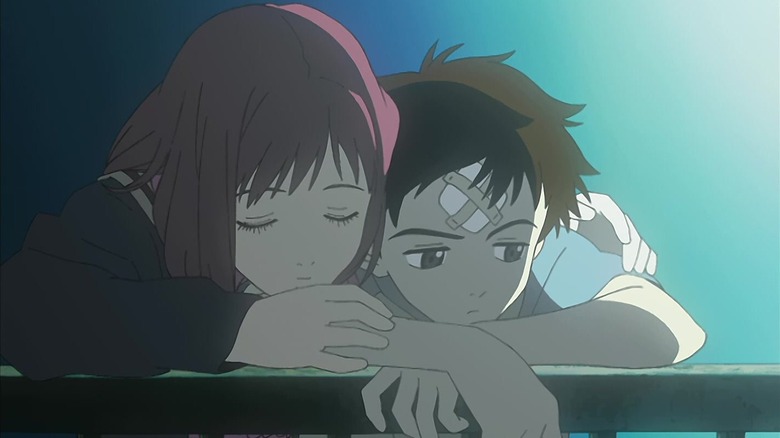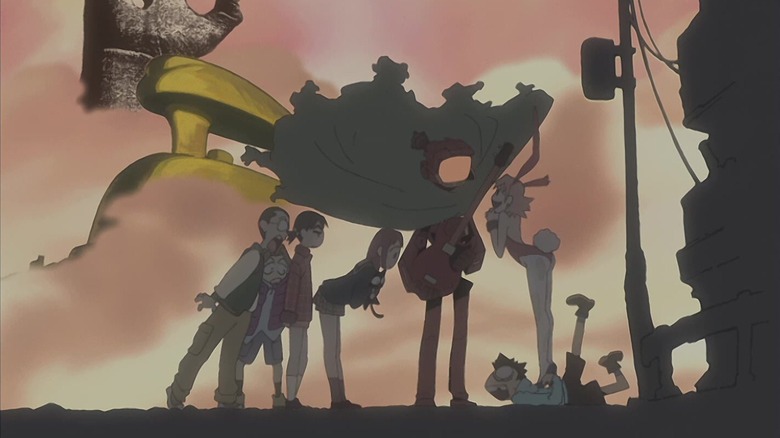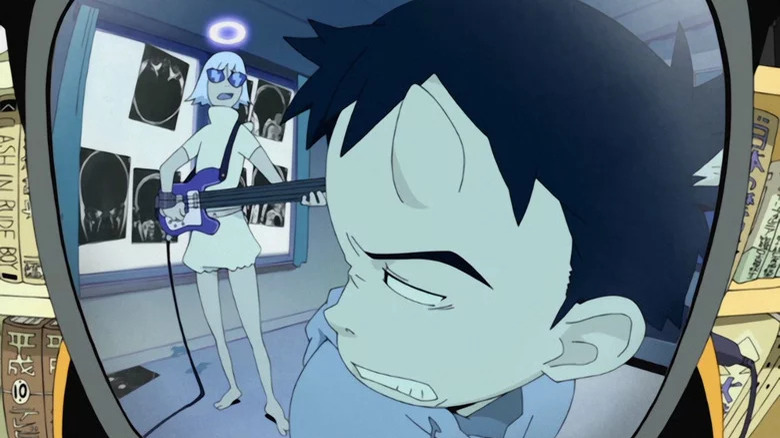The Daily Stream: FLCL Was A Surrealist Coming-Of-Age Story Ahead Of Its Time
(Welcome to The Daily Stream, an ongoing series in which the /Film team shares what they've been watching, why it's worth checking out, and where you can stream it.)
The series: "FLCL"
Where you can stream it: Hulu, FUNimation Now, AdultSwim.com
The pitch: Being a 12-year-old boy is tough enough, but Naota (Jun Mizuki) has it harder than most. He feels abandoned by his older brother, who went to America to play baseball and left his teenage girlfriend Mamimi (Izumi Kasagi) behind. Mamimi flirts with Naota and calls him by his brother's name, but then things go from weird to wacky when a young woman named Haruko (Mayumi Shintani) hits him with her Vespa and then clocks him upside the head with her guitar. The guitar hit causes a horn to grow out of his head, and that horn becomes a robot. All of this happens within the first episode, and the ride only gets wilder from there. "FLCL," often pronounced "Fooly Cooly" or "Furi Kuri," is a coming-of-age story unlike any other, and in only six episodes it manages to tell a bigger, bolder story than some shows do with hundreds of them.
"FLCL" was directed by Kazuya Tsurumaki and written by Yōji Enokido, and the six-episode OVA debuted alongside a manga adaptation. Tsurumaki was close friends with "Neon Genesis Evangelion" creator Hideaki Anno, and "FLCL" has similar themes of boys feeling let down by their fathers, manic-pixie dream women as forces for change, and, of course, mechs! The big difference is that "FLCL" is an anti-formalist, fast-paced rebellion. This is the MTV generation's ultimate anime, with a soundtrack by the Japanese rock band The Pillows. There is nothing quite like "FLCL," and it helped an entire generation of American anime fans realize the full power of the medium.
Why it's essential viewing
Adolescence is a truly strange time, and "FLCL" somehow manages to render that hormone-driven, heart-wrenching time of our lives into a sweet and silly sci-fi story so chock full of ideas that it's possible to find something new every time you watch. The OVA debuted in Japan from 2000 to 2001 and premiered in the U.S. on Adult Swim's Toonami block in 2003. Toonami was already making a pretty big splash, introducing Americans to shows like "Cowboy Bebop," "Trigun," "Outlaw Star," and more, but when the first episode of "FLCL" hit the airwaves, it was a shock. That first episode was so electric, so indescribably cool, and it seemed plugged into the ADHD-driven model of entertainment that was just starting to build online. The high-intensity, totally bonkers energy was irresistible to many who watched, and "FLCL" was almost an immediate cult hit, with a dedicated fanbase worldwide.
"FLCL" premiered on Toonami at almost the exact perfect time in my life. I was 16 years old, a rambunctious teenager who wanted to be a manic pixie space alien like Haruko. I also fully appreciated that despite the world-bending sci-fi weirdness of it all, Naota's struggles feel truly authentic. He has some unhealthy relationships/infatuations with older girls who take advantage of his kindness, his father is a skirt-chasing anime nerd who hasn't exactly been a great dad, and no matter what he does, it seems like he's in over his head. While many of his anime protagonist peers are whiny, self-absorbed brats who sulk and complain more than anything else, Naota is a lovable kid who just can't seem to catch a break.
The power of a teenage crush
There's a lot going on in "FLCL," but the most important thing is Naota's arc as he learns how to stand up for himself and set healthy boundaries. There are intergalactic robots, a giant bomb headed toward Earth shaped like a baseball, and so much more, but at the heart of it all is a preteen boy learning what adulthood means. Everyone around Naota tells him to act like an adult, but none of the adults in his life have been role models. He's also dealing with puberty and the effects thereof, hilariously represented by the "horn" that grows out of his head whenever he gets too close to one of the many girls/young women he's crushing on. While many stories about preteens pull their punches, hiding the idea of the beginnings of sexuality behind cutesy, chaste tropes, "FLCL" does no such thing. It is unabashedly, unambiguously horny, with characters young and old trying to reconcile their desires with what's actually appropriate.
A lot of the comedy in "FLCL" comes from sex jokes of some form or another, from basic visual gags involving phallic-shaped objects to a bizarre misunderstanding when Naota thinks Haruko is having sex with his father. While some of it might seem shocking given the ages of the characters, I also remember being a preteen and writing "Gundam Wing" fanfiction that would make anyone blush. As Naota matures in his experiences with Haruko, Mamimi, and his schoolmate Eri, he starts realizing that the reason no one can tell him how to be an adult is that none of them actually know themselves. We're all just doing the best we can with what we've got.
An anime that says 'why not?'
Just as Naota learns that there aren't really rules to being an adult and that we have to figure it out as we go along, "FLCL" is a celebration of chucking the rulebook in the garbage and lighting it on fire. The OVA is so wildly experimental and audacious that it's sometimes hard to believe it came out 20 years ago. There are so many ideas within "FLCL" that shouldn't work, from using guitars as both weapons and modes of transportation to Naota's horn becoming a robot buddy named Canti, but the series just goes for it anyway. There are dozens of times when someone could have stopped the creators and asked "why," but instead they just went for it, creating one of the most imaginative and boundary-pushing animated stories ever made. It's not difficult to draw a line from "FLCL" to 2010s hits like "Kill la Kill" and the contemporary behemoth that is "Chainsaw Man," as its anti-authoritarian, punk-rock attitude inspired creators to take bigger, weirder risks.
"FLCL" embraces a kind of optimistic nihilism, as Naota and his family and friends never exactly figure out what FLCL is, but Naota tells them it doesn't matter. Life is chaos, no one really understands anything, and we have to take care of ourselves and the people we love because no one else will. It's pretty deep stuff for a show about robotic forehead space boners, but that's what makes "FLCL" so great.



